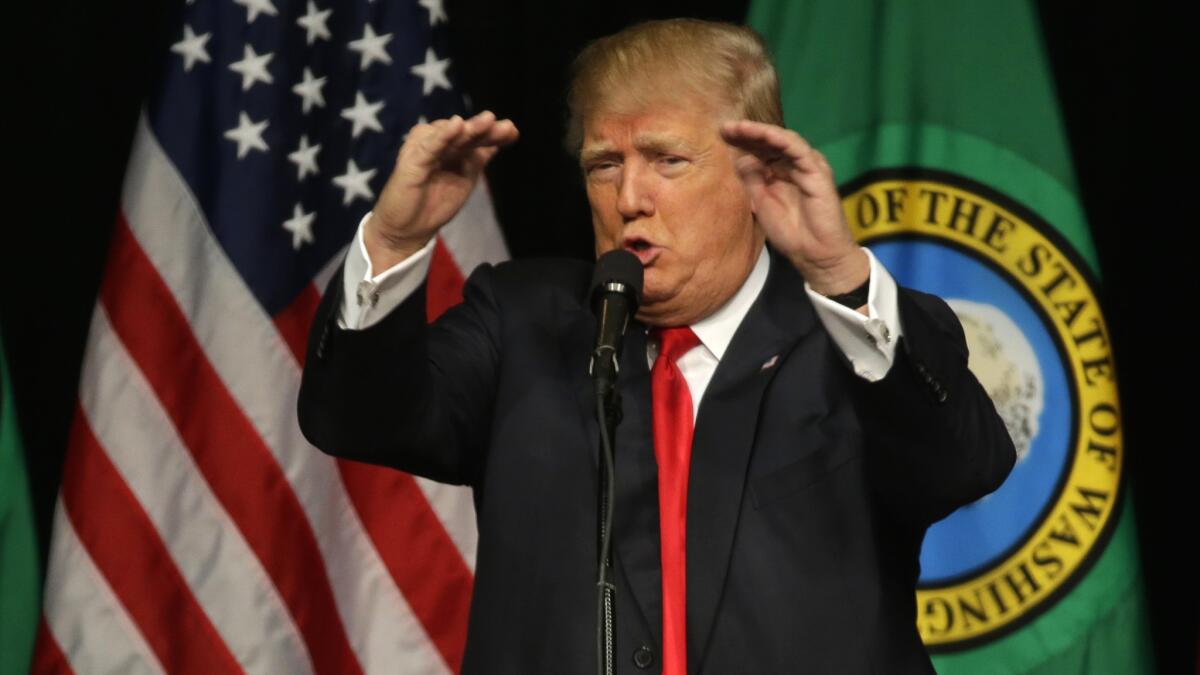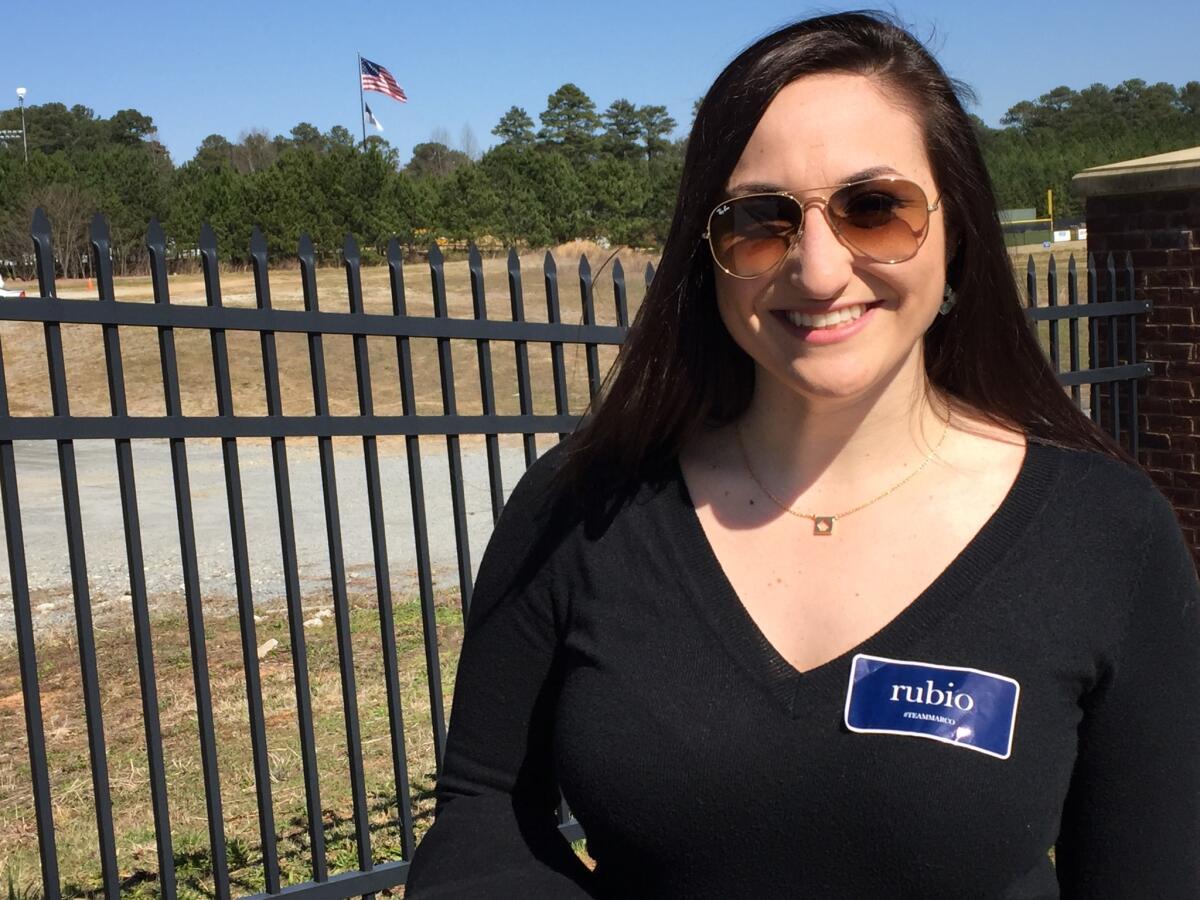These Republicans couldnât possibly vote for Trump, but will they go for Clinton?

Donald Trump speaks at a May 7 rally.
Reporting from Washington â Atlanta-area attorney Mathew Titus, a faithful Republican and suburban father of three, is so disheartened with Donald Trump as the presumed GOP nominee he plans to sit out the presidential election this year.
Titus, 36, preferred what he saw as Sen. Marco Rubioâs modern, optimistic approach to Republican ideology
Trumpâs surprise ascent even convinced Titus to reconsider his dream of running for local office. When he votes in November, he expects to leave the top of his ballot blank rather than vote for the New York businessman.
âThat the party, the electorate, would favor Trump is crazy in my mind,â said Titus, adding that several of his friends feel the same way. âI definitely feel like an orphan .... Am I even part of this party?â
Election 2016 | Live coverage on Trail Guide | Track the delegate race | Sign up for the newsletter
Every election has its sore losers. But this yearâs rowdy Republican primary promises to make the party-unification process more difficult than usual.
Left in the wake of Trumpâs victory are many holdout Republican voters like Titus, who are wringing their hands over whether they can get to yes on Trump, and, if not, what they will do in November.
Itâs a particularly tough decision for young, upscale suburban voters in places like metro Atlanta and Northern Virginia, where Trump lost several counties to Rubio in primary voting. They will become battlegrounds this fall, with Democrats already trying to exploit the lingering ambivalence about Trump among more moderate Republicans.

Whether these Republicans would ever flip to Hillary Clinton, the likely Democratic candidate, remains very questionable. And recent polls suggest a growing number of Republican voters are coming around to the idea of Trump as their candidate.
But for these Trump holdouts, the frustration is apparent.
Will Kremer, 22, disagrees with Democrats on taxes and fiscal issues, but the political science student said he just canât accept Trumpâs divisive statements about Muslims, immigrants and women.
âFor now, and the foreseeable future, Iâm on the âNever Trumpâ bandwagon,â said Kremer, who supported Scott Walker and was Georgia co-chair of Students for Walker, then shifted to Rubioâs campaign after the Wisconsin governor exited the race.
Trump fans ask when heâll join the Trump train, and he throws the question back to them.
âI say, âWhen is he going to stop making racist and misogynist remarks?ââ said Kremer, who also works at his familyâs trucking insurance company. âI have kind of come to the belief that party loyalty has its limits.â
Kremer recalled Trumpâs taco bowl tweet on Cinco de Mayo as the kind of insensitive infraction that makes it hard to support the billionaire. âI wanted to pound my head in the desk,â he said.

Sydney Rubin, who backed Rubio and has worked for Republicans, is also struggling over her November vote. She worries that Trump is hurting the GOPâs image, but canât bring herself to vote for Clinton.
âFor somebody like me, whoâs 25 and moderate, and worked in Republican politics for a while, heâs just not somebody Iâm proud to support,â said Rubin, a University of Georgia graduate who does government relations for a trade association.
âIâd never knock a door for him,â she said. âA lot of my friends are voting for Hillary â a lot of GOP friends.â
Usually, the parties put on a display of unity after bitter nomination battles. Rival candidates make a show of rallying around the presumed nominee, lending endorsements, sharing staff and offering up resources â namely prized email lists â for the fall campaign against the opponent.
But in the Trump era, that system appears to be breaking down for Republicans.
âThe traditional campaign model hasnât been anything [Trumpâs campaign has] used, and I donât think they see a reason yet to use it,â said Pete Seat, who was Ohio Gov. John Kasichâs campaign spokesman in Indiana, and a former White House staffer in the George W. Bush administration.
While Trump has picked up support from some former rivals, including Ben Carson, others are doing little to help him bridge party unity.
Rubio recently said that he would support the nominee, but more notable was what he didnât do, observers noted: He did not ask his voters to do the same and he has not released his delegates to vote for Trump on the first ballot at the GOP convention.
Sen. Ted Cruz and Kasich have not yet come around to support Trump, and former Florida Gov. Jeb Bush has made it clear he will never vote for Trump.
The Trump holdouts might not be easily swayed.
New polling shows more than half of American voters are dissatisfied with either Trump or Clinton. Trumpâs off-the-charts unpopularity â he was viewed unfavorably by two-thirds of Americans this spring, a high not seen since President Nixon â has since improved.
While Trump did well among most categories of Republican primary voters, one notable shortcoming was among the more affluent and educated in suburban metro areas in Northern Virginia, Atlanta and Des Moines, where Rubio handily won.
Rubio beat Trump among voters earning more than $100,000 a year in Georgia, exit polls showed, winning several upscale counties around Atlanta.
In Virginia, Rubio outperformed Trump among the most educated voters, those with college and post-graduate degrees, but also with the new generation of 17-29 year-old voters and those ages 30-44, often parents of young families.
Both parties have long fought over this demographic slice of the electorate â particularly women, who can help tilt outcomes.
Clintonâs campaign is already making a subtle play for these voters.
Earlier this month, Clinton visited working families at a coffee shop in Virginiaâs Loudoun County, which Rubio won in the primary, focusing precisely on women who may be uncomfortable with Trump.
The campaign routinely sends out lengthy lists of prominent Republicans like Mitt Romney who have said they cannot support Trump, suggesting itâs OK to stray from party loyalty. The goal is to make it easier for Republicans to switch.
âWhen every living GOP president and the most recent GOP nominee wonât support Donald Trump, it makes it OK for Republicans voters to do what their heart is telling them and hold back from supporting him,â said a Democrat with knowledge of the Clinton campaign.
See the most-read stories this hour >>
The safer route may be to encourage disgruntled Republicans to simply stay home on election day, avoiding a risky and costly investment to try to flip their votes.
âThe goal for Democrats is for them not to vote,â said one GOP strategist, granted anonymity to discuss the situation. âThe best way to get them not to vote is to leave them alone.â
Trump, meanwhile, remains optimistic that reluctant Republican leaders like Ryan are turning his way, and that he can grow the party beyond its base of conservatives. Once GOP leaders like House Speaker Paul Ryan fall in line, many Trump holdouts will likely follow, Trump supporters predict.
âYouâre going to see as unified a Republican Party as we have seen in a long, long time,â former rival-turned-supporter Rick Perry, the former Texas governor, said on a donor call for the pro-Trump PAC.
But educated, upscale Republicans arenât the only Republicans that Trump is having a hard time winning over.
Bruce Garraway, a deacon and former vice mayor of Snellville in the Atlanta suburbs, is having a tough time matching his conservative values to Trumpâs campaign rhetoric.
Even though Trump swept evangelicals in the primaries, Garraway said many conservative Christians he knows wonât vote for him.
âWe have a huge crowd saying never Trump, but whatâs that going to get us? Is that going to give us Hillary Clinton?â he said. Many Republican voters oppose Democrats because of their views on social issues like abortion and gay marriage.
He still pines for what could have been â his choice was Cruz, âthe perfect conservative candidate.â He is unlikely not to vote. But he is not yet a yes on Trump.
âIâm still in a quandary,â he said, âand struggling.â
MORE POLITICS NEWS
Hillary Clinton says Donald Trump isnât fit for the Oval Office
Stop Trump? Hereâs why a third-party effort will probably fizzle
Trump announces his Supreme Court picks, including one who has repeatedly mocked him
Follow on Twitter @LisaMascaro
More to Read
Get the L.A. Times Politics newsletter
Deeply reported insights into legislation, politics and policy from Sacramento, Washington and beyond. In your inbox three times per week.
You may occasionally receive promotional content from the Los Angeles Times.








